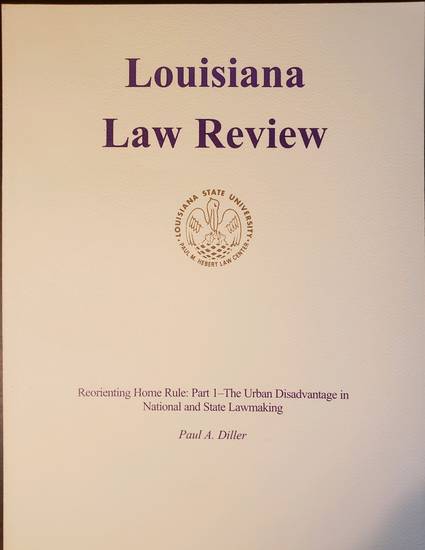
Article
Reorienting Home Rule: Part 1 -- The Urban Disadvantage in National and State Lawmaking
Louisiana Law Review
(2016)
Abstract
This Article explains how urban residents suffer a significant disadvantage in lawmaking at the national and state levels. Other scholars have explained convincingly how the United States government is non- or even counter-majoritarian. This Article builds on that literature by explaining how American legislative countermajoritarianism operates in a distinctly anti-urban way. The most obvious contributor to an anti-urban bias at the federal level is the Senate, whose egregious malapportionment disadvantages urban priorities by overvaluing small- and rural-state preferences. As a result, although a majority of the nation may favor stricter gun control, for instance, the counter-majoritarian Senate stifles that preference at the national level.
A subtler, but still substantial, contributor to the urban disadvantage in lawmaking is the widespread use of single-member, winner-take-all-districts to constitute the federal House of Representatives and almost all state legislative chambers. Drawing on recent political science, this Article explains how the use of district-based elections systematically discriminates against the views of urban residents, even in the absence of intentional, politically motivated gerrymandering. Because left-leaning voters reside in dense, urban areas, their favored candidates waste comparatively more votes in winning their districts than do victorious candidates with different or opposing views in suburban, exurban, and rural districts. Hence, the candidates of the urban-favored political party may win more votes overall, but lose the total seat count.
Add in the lack of structural protections for big cities and metropolitan areas akin to that which states enjoy in the federal order, and the net result is federal and many state governments that treat urban policy preferences with indifference, if not outright hostility. For this reason, the urban-centered majority that elected a president in 2008 and 2012 was largely stymied by a Congress structurally designed to skew away from that majority’s preferences. With nowhere left to turn, urban voters have increasingly looked to their own municipal governments to enact their policy preferences, whether related to matters traditionally “local” or not.
Note: This article went to print shortly before the November 2016 elections. I analyze those results' impact on this paper's thesis in my blog post here: https://dilleradollar.wordpress.com/2016/12/22/the-urban-disadvantage-updated/?iframe=true&theme_preview=true
Keywords
- local government,
- urban,
- one-person one-vote,
- malapportionment,
- Senate,
- gerrymandering,
- districting,
- redistricting,
- median voter,
- federalism,
- localism,
- home rule
Disciplines
Publication Date
Fall November 28, 2016
DOI
http://digitalcommons.law.lsu.edu/cgi/viewcontent.cgi?article=6613&context=lalrev
Citation Information
Paul A Diller. "Reorienting Home Rule: Part 1 -- The Urban Disadvantage in National and State Lawmaking" Louisiana Law Review Vol. 77 Iss. 2 (2016) p. 287 - 358 Available at: http://works.bepress.com/paul_diller/14/
